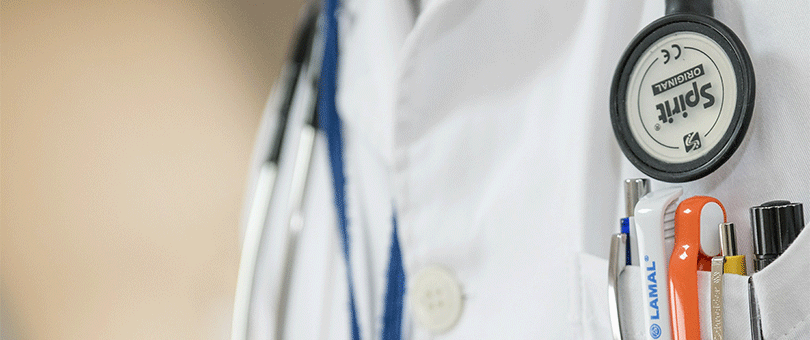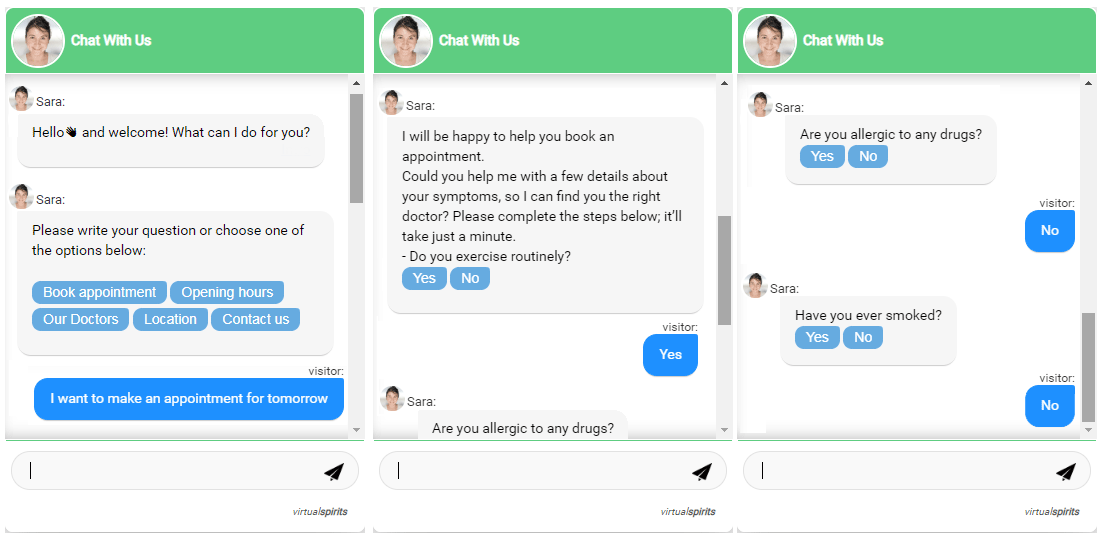
TOPICS:
Chatbot for Healthcare Chatbot for Service Building a chatbot
Doctor Appointment Chatbot: Create a chatbot to make an appointment at the clinic
It’s only natural to be met with raised eyebrows while mentioning healthcare and AI chatbots in one sentence. But chatbots are quite the opposite of a threat for the medical industry. They are built to perform basic and repetitive tasks that can streamline the day-to-day functioning of a medical practice. Most of all, they assist with appointment scheduling.
Think of medical chatbots as virtual assistants for your clinic, hospital, or healthcare center. They’re inexpensive, easy to add to your website, and highly efficient at what they do. To make the picture a little clearer, let’s run through some of the benefits you get when you create a chatbot to make appointments at your clinic.
Chatbot for quick and easy appointment scheduling:
Like any other business, the modern medical practice needs to be up-to-speed with the preferences of its target clientele. When patients are strapped for time, the last thing they want is to have to visit the doctor’s clinic in person to make an appointment. Even calling the clinic and waiting on the line can be less than ideal sometimes. In any case, neither of these methods matches the simplicity and convenience of typing a quick request into a chat window and getting a confirmed appointment.

Picture this conversation.
Chatbot:
“Hi, how can I help you today?”Patient:
“I want to make an appointment.”Chatbot:
“Sure! Please choose one of the available dates and time slots from the calendar below and I’ll book it for you.”The above interaction takes a matter of seconds, and can take place at any hour of the day, any day of the week. With an online chatbot available on your website 24/7, your patients can make an appointment with you first thing in the morning, even if they get their first symptoms late in the night. And the simple, conversational nature of the chat ensures that even senior citizens who aren’t well-versed with the nuances of using the internet, don’t struggle with the booking process.
Chatbots helps with accurate doctor-patient matching:
Often, patients don’t know what their symptoms can be indicative of. So when Arthur, a 40-year-old accountant, starts experiencing dizziness every morning when he gets to work, he isn’t sure if the problem is neurological, dietary, or posture-related. Who should he be seeing – a neurologist, a physiotherapist, or a GP? If your clinic’s website has a symptom checker function that can match patients with the right doctors, people like Arthur will appreciate it very much. It’s even better if he can use this function while scheduling an appointment over chat. Here’s what Arthur’s conversation with your doctor appointment chatbot will look like:
Chatbot:
“Hello, and welcome! What can I do for you?”Arthur:
“I want to make an appointment for tomorrow.”Chatbot:
“Sure! Do you know which doctor you would like to see? Or can I help you find one?”Arthur:
“I’m not sure.”Chatbot:
“No problem. Could you help me with a few details about your symptoms so I can find you the right doctor? Please complete the steps below; it’ll take just a minute.”Arthur fills in a simple questionnaire about his symptoms.
Chatbot:
“Thanks! I’ve got your details, and here are the doctors who can see you tomorrow. Let me know your preference and I’ll schedule your appointment.”This personalized service reassures patients like Arthur that they’re being taken care of. In contrast, explaining your symptoms to someone over the phone can be difficult and time consuming. Automate the process via chat to save man hours while also increasing your chances of repeat business.
Automated customer support using chatbot:
You may be building chatbots for appointment scheduling alone, but what you also have in the process is a customer support desk right there on a corner of your website. During medical chatbot development, doctors and healthcare providers can incorporate basic FAQs in the chat script, so that visitors and patients can get the information they need without calling you up. The best chatbots for medical services are able to answer questions like:
“Where are you located?”“What are your drug store opening hours?”“Is the clinic open on weekends?”They are also able to schedule follow-up appointments using a patient’s booking history, send out reminders about upcoming appointments, and even manage payments for consultations and procedures. With your chatbot handling these simple tasks that are usually common to all patients, your clinic’s staff can focus on more complex work that involves human engagement.
Readily available emergency aid from chatbot:
If you create a chatbot while keeping the above advantages in mind, you already have an efficient virtual assistant for your practice. What will help your practice even more is an emergency-ready medical chatbot. So for example, if yours is a medium to large-scale establishment with multiple departments, you can enable your chatbot to give out important emergency contact information to patients who don’t have the time to look for it themselves.
So when someone types “ED contact number”, your chatbot could give them the phone numbers of the emergency department, and the details of the doctor in charge at the moment.
This sort of readily available assistance inspires trust in your practice, and goes a long way in keeping your calendar full.
For more information on building chatbots for medical services, or to understand what chatbot development can do for your practice, reach out to us right here.